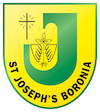ENVIRONMENT
St Joseph’s explores its stewardship through a wide range of learning experiences in environmental education. We are a part of the Victorian Catholic Schools Sustainable Project and this directly impacts on our curriculum. Children, parents and staff manage resources and facilities including energy, waste, water, and biodiversity. It is our vision to make our school more sustainable and look to the wider community to support us in this initiative.
The Wormery
The children maintain a ‘Wormery,’ and harvest worm juice and castings to fertilize garden produce. Excess juice is bottled and sold to parents and money taken is returned straight back into seedlings, and resources for the garden. Compost bins provide a valuable option for recyclable food scraps from children lunches, and high quality compost is then available to fertilize kitchen garden crops.
The Chickens
Chickens are a popular addition to our Kitchen Garden and the children are responsible for their care. Checking water and food supply and safe lodgings is a highly sort after job. Fresh eggs are collected daily, used in cooking activities and excess stock is sold to parents to pay for the ongoing care of chickens.
The Environmental Trail
Our playground hosts some of the last remaining remnant forest in Boronia. An ongoing program to plant understorey plants to complement the existing trees has led to the instigation of an environmental trail, which meanders through the existing vegetation. Local Knox Environmental groups and council have assisted us in our vision to bring back native flora and fauna. Through curriculum units, children completed audits on flora and fauna native to the area. Play areas were assessed and altered to enable a planting of the environmental trail. Art work completed by the students and in collaboration with Placemakers, a community art group, punctuates the trail and identifies the flora and fauna that is rare in our area.
A frog bog and fish pond encourages birds, frogs and other wild life into our grounds and are an important addition to our natural setting.
Partnerships made with local environmental groups encourage children to take action in their wider community , eg. revegetation projects along Blind Creek.
Kitchen Garden
The kitchen garden program at St Joseph’s provides the opportunity for students to engage in multi-sensory environmental learning activities. Students explore practical ways of living sustainably. They learn about aspects of gardening, including propagating, planting, harvesting, seed collecting, composting and worm farming. Students also care for a healthy flock of chickens, and learn about their life cycle.The Contemporary Learning Centre provides a kitchen and dining area for the students to prepare, cook and sample produce from the garden. They learn about the safe and hygienic preparation of food, they are encouraged to exlore new flavours and they learn about table etiquette.
Conservation area
A conservation area borders the playground and is home to many native and indigenous plants.
Solar Panels
In our quest to become a sustainable school, St Joseph’s has installed solar panels via A State and Federal Government Grant. Energy Saving Monitors in each room assist the school to reduce the amount of energy used throughout the school. The school has also recently replaced a majority of the Flourescent Tube lighting with energy-efficient LED lighting to further reduce the school’s energy consumption.
Environmental Team
The school has a School Environmental Action Committee (SEAC) responsible for leading environmental practices throughout the school. This committee is made up of students elected democratically from the middle and senior grades, and of teachers representing each level of the school. The team is involved in all areas of our environmental program, including taking part in wider community programs such as ‘Plastic Bag Round-Up’, the Knox Council ‘Street Wise’ Survey and the Yates pumpkin challenge. They organize celebration days such as ‘Layer’ days (encouraging jumpers and scarves rather than excess heating) and ‘Nude Lunch’ days (no wrappers on lunches) as well as ‘Walk or Ride to School’ days. SEAC members also encourage wise water use, and energy saving actions. They promote these activities within the school by reporting to school assemblies and communicating through the school newsletter. A tri-bin system to encourage good recycling habits (compost-recycle-waste) exists in all areas of the school and was introduced by the members of SEAC. The committee is also involved in the planning and organization of ‘Dig it Day’, an annual event celebrated by the whole school and held in spring each year.


